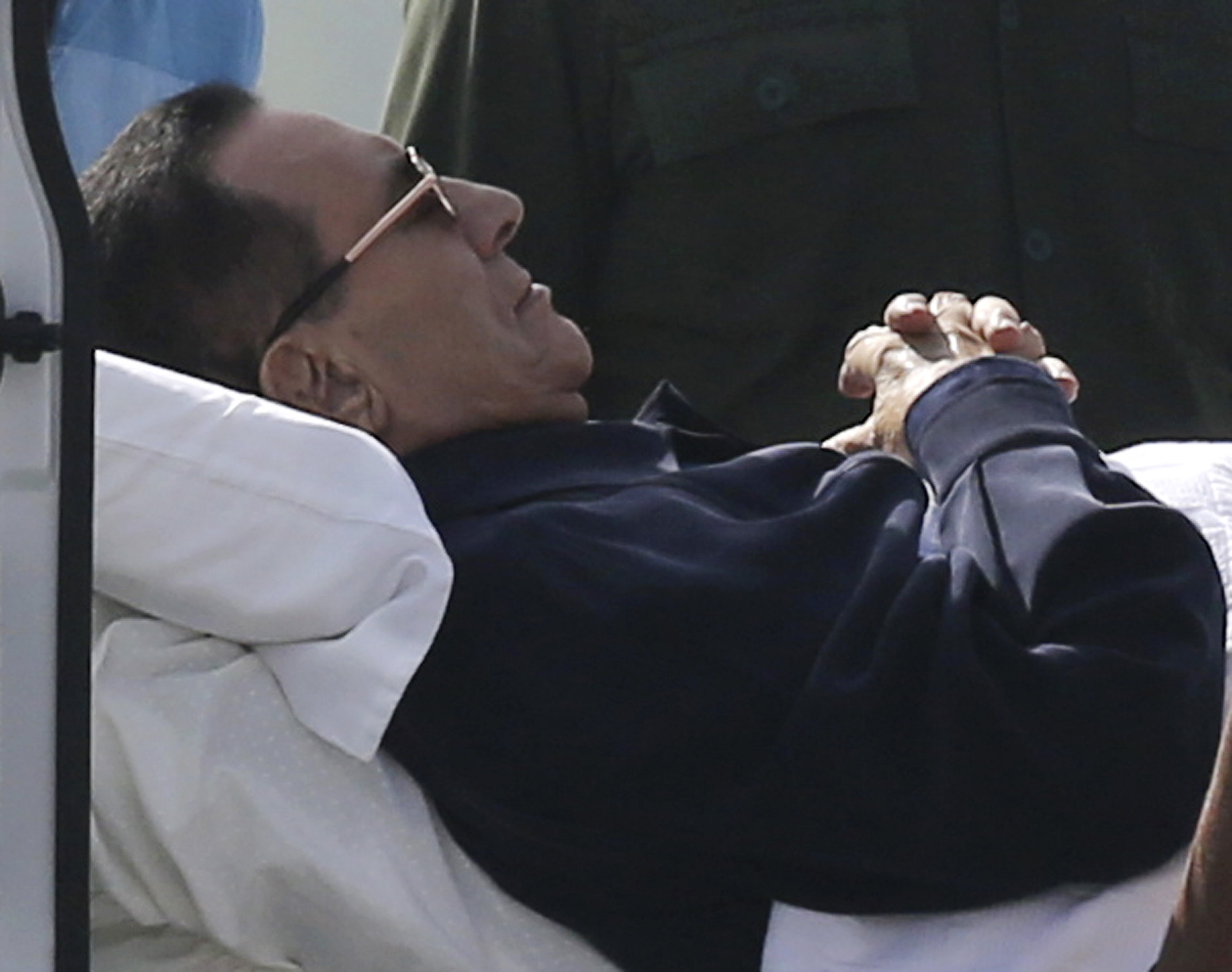Latest NEWS
- Aswat Masriya, the last word
- Roundup of Egypt's press headlines on March 15, 2017
- Roundup of Egypt's press headlines on March 14, 2017
- Former Egyptian President Hosni Mubarak to be released: lawyer
- Roundup of Egypt's press headlines on March 13, 2017
- Egypt's capital set to grow by half a million in 2017
- Egypt's wheat reserves to double with start of harvest -supply min
- Roundup of Egypt's press headlines on March 12, 2017
UPDATE - Mubarak sentence over killing protesters postponed to Nov 29

Former Egyptian President Hosni Mubarak lies on a stretcher while being transported ahead of his trial in Cairo September 27, 2014. REUTERS/Mohamed Abd El Ghany
CAIRO, Sept 27 (Aswat Masriya) - The Cairo Criminal Court postponed on Saturday the trial of Egypt's former President Hosni Mubarak over killing protesters to November 29, despite a scheduled verdict on Saturday.
The former president is being tried alongside his interior minister and six of his aides on charges of killing protesters during the 18-day January 2011 uprising which toppled his regime.
The trial was held at the Police Academy amid heavy security presence. It was postponed with the ongoing detention of former Interior Minister Habib al-Adly.
The judge heading the trial, Mahmoud al-Rashidi, said the verdict was postponed because the court needs more time to prepare the reasons for judgement. Rashidi said he was only done with 60 percent of the reasons for judgement.
Before announcing his decision to postpone the trial, Rashidi played a video illustrating the 160 thousand documents he said he had to go through before issuing a verdict. The video was prepared by private-owned channel Sada al-Balad, which won exclusive rights to broadcast the trial's final hearing on August 13, when Mubarak testified on his own behalf.
"This is a national case," Rashidi said before announcing the decision to postpone the verdict. He added that he must provide evidence supporting any decisions he makes.
Gamal Eid, lawyer and director of the Cairo-based Arab Network for Human Rights Information, criticised the video shown during the trial, describing the incident as "illegal and alarming." The video showed a television presenter going through the documents of the case; Eid said the court should be more concerned about the safety of such important documents.
George Ishaq, member of the state-affiliated National Council for Human Rights, meanwhile told Aswat Masriya that what happened during Saturday's session "paves the way for acquitting Mubarak" of the charges leveled against him.
Mubarak, his two sons and an Egyptian businessman, Hussein Salem, are also being tried at the same court on corruption charges related to the export of gas to Israel. Salem is tried in absentia.
The defendants are also being tried over inciting violence and creating a security vacuum during the early days of the uprising.
When testifying on his own behalf, the former president denied he ordered the killing of protesters who participated in the January 25, 2011 uprising.
"Mubarak, who stands in front of you, would never order the killing of protesters ... or any Egyptian under any conditions," Mubarak said on August 13. The former president also denied he was behind the security vacuum which started on January 28 in 2011 following an unprecedented wave of protests. Mubarak dismissed as well financial corruption charges leveled against him.
Mubarak's sons, Alaa and Gamal waived their right to testify on their own behalf in court, according to their lawyer Farid al-Deeb. The remaining seven defendants tried in session all denied the accusations they are facing.
Mubarak and his interior minister were sentenced to life in prison in 2012 for the same charges before an appeals court ordered their retrial. The retrial began in April, 2013.
In May, a Cairo court sentenced Mubarak to three years in prison on embezzlement charges, while his two sons were sentenced to four years in prison for the same charges.
He is serving time in a military hospital in Cairo.










